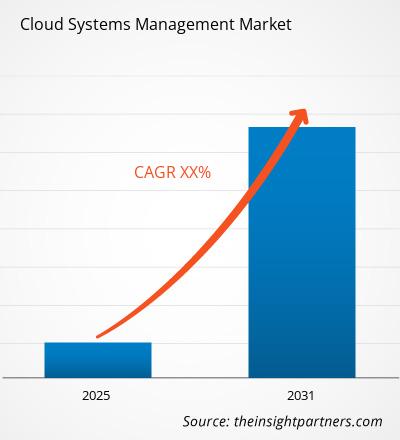MARKET INTRODUCTION
Cloud system management software is a management framework that controls cloud operations and automation as per the desired orientation. The major applications offered by the cloud system management software includes cloud automation, configuration management, workload scheduling, cloud performance, and event and problem management. It also provides flexibility to manage, monitor, and enhance the resource management for organizations reliant on business requirements. Cloud systems management software services are increasingly adopted by the enterprises, mainly due to the benefits they offer, such as better staff efficiency, easy deployment, higher responsiveness to end-users, optimum resource utilization, reduced cost of maintenance, and improved quality.
MARKET DYNAMICS
Shifting workloads of enterprises toward cloud environments is driving the growth of the cloud systems management market. However, the growing number of cloud cyberattacks and security breach incidents may restrain the growth of the cloud systems management market. Furthermore, the proactive investments by enterprises in cloud-based models is anticipated to create market opportunity for the cloud systems management market during the forecast period.
MARKET SCOPE
The "Global Cloud Systems Management Market Analysis To 2031" is a specialized and in-depth study of the technology, media and telecommunications industry with a special focus on the global market trend analysis. The cloud systems management market report aims to provide an overview of the cloud systems management market with detailed market segmentation by component, deployment model, organization size, and geography. The global cloud systems management market is expected to witness high growth during the forecast period. The report provides key statistics on the market status of the leading cloud systems management market players and offers key trends and opportunities in the market.
MARKET SEGMENTATION
The global cloud systems management market is segmented on the basis of component, deployment model, and organization size. Based on component, the cloud systems management market is segmented into: IT operations management, IT service management, and IT automation and configuration management. On the basis of deployment model, the cloud systems management market is segmented into: on-premises and cloud based. Based on organization size, the cloud systems management market is segmented into: SMEs and large enterprises.
REGIONAL FRAMEWORK
The report provides a detailed overview of the industry including both qualitative and quantitative information. It provides an overview and forecast of the global cloud systems management market based on various segments. It also provides market size and forecast estimates from the year 2021 to 2031 with respect to five major regions, namely; North America, Europe, Asia-Pacific (APAC), Middle East and Africa (MEA) and South & Central America. The cloud systems management market by each region is later sub-segmented by respective countries and segments. The cloud systems management market report covers the analysis and forecast of 18 countries globally along with the current trend and opportunities prevailing in the region.
The report analyzes factors affecting the cloud systems management market from both demand and supply side and further evaluates market dynamics affecting the market during the forecast period i.e., drivers, restraints, opportunities, and future trend. The report also provides exhaustive PEST analysis highlighting factors affecting the cloud systems management market in these regions.
MARKET PLAYERS
The reports cover key developments in the cloud systems management market as organic and inorganic growth strategies. Various companies are focusing on organic growth strategies such as product launches, product approvals and others such as patents and events. Inorganic growth strategies activities witnessed in the market were acquisitions, and partnership & collaborations. These activities have paved way for the expansion of business and customer base of market players. The market players from cloud systems management market are anticipated to lucrative growth opportunities in the future with the rising demand for filter products in the global market. Below mentioned is the list of few companies engaged in the cloud systems management market.
The report also includes the profiles of key companies along with their SWOT analysis and market strategies in the cloud systems management market. In addition, the report focuses on leading industry players with information such as company profiles, components, and services offered, financial information of the last 3 years, the key development in the past five years.
- BMC Software, Inc.
- Cisco Systems, Inc.
- Datadog
- Dynatrace, Inc.
- IBM Corporation
- Microsoft Corporation
- New Relic
- ServiceNow
- Splunk Inc.
- Vmware
Cloud Systems Management Report Scope
| Report Attribute | Details |
|---|---|
| Market size in 2024 | US$ XX million |
| Market Size by 2031 | US$ XX Million |
| Global CAGR (2025 - 2031) | XX% |
| Historical Data | 2021-2023 |
| Forecast period | 2025-2031 |
| Segments Covered |
By Component
|
| Regions and Countries Covered | North America
|
| Market leaders and key company profiles |
- Historical Analysis (2 Years), Base Year, Forecast (7 Years) with CAGR
- PEST and SWOT Analysis
- Market Size Value / Volume - Global, Regional, Country
- Industry and Competitive Landscape
- Excel Dataset



Report Coverage
Revenue forecast, Company Analysis, Industry landscape, Growth factors, and Trends

Segment Covered
This text is related
to segments covered.

Regional Scope
North America, Europe, Asia Pacific, Middle East & Africa, South & Central America

Country Scope
This text is related
to country scope.
Trends and growth analysis reports related to Technology, Media and Telecommunications : READ MORE..
The List of Companies
1. BMC Software, Inc.
2. Cisco Systems, Inc.
3. Datadog
4. Dynatrace, Inc.
5. IBM Corporation
6. Microsoft Corporation
7. New Relic
8. ServiceNow
9. Splunk Inc.
10. Vmware
1. BMC Software, Inc.
2. Cisco Systems, Inc.
3. Datadog
4. Dynatrace, Inc.
5. IBM Corporation
6. Microsoft Corporation
7. New Relic
8. ServiceNow
9. Splunk Inc.
10. Vmware

 Get Free Sample For
Get Free Sample For